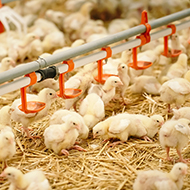Slow-grown chickens experience higher levels of welfare - study

"We hope that it will help to drive changes in supply chains and large companies to bring about real improvements to chicken welfare" - Dr Mullan, Bristol Vet School.
Slow-grown chickens experience better health and play more than conventional breeds of birds, according to new research.
The study, published in Scientific Reports, found that shifting away from fast-growing breeds 'would provide the most significant improvement for the lives of the 142 million chickens produced in Europe every week.'
Commenting on the finding, Dr Siobhan Mullan, a senior research fellow in animal welfare at Bristol Vet School, said: “We hope that it will help to drive changes in supply chains and large companies to bring about real improvements to chicken welfare."
Most birds produced for human consumption are known as conventional, fast-growing breeds. This research is the first of its kind to investigate the welfare differences between fast and slower-growing broilers in a commercial setting, using a comprehensive suite of positive and negative welfare indicators.
In the study, researchers applied the indicators to four production systems varying in stocking density and breed. One slower growing breed (the slowest) was stocked at a planned maximum density of 30 kg/m2, a second slower growing breed at planned densities of 30 kg/m2 and 34 kg/m2. The welfare outcomes were then compared to those of a standard fast-growing breed stocked at 34kg/m2.
The team found that, at the lower density, the slowest growing breed had slightly better welfare than the other slower-growing breed - as suggested by lower mortality, fewer rejections at processing and better walking ability.
Welfare differences of slower-growing breed stocked at two densities were small. Prominent differences were found, however, between the standard fast-growing birds stocked at 34kg/m2 and birds in the three other systems.
Researches note that the standard birds experienced poorer health as indicated by higher levels of mortality, hock burn and pododermatitis, as well as greater rejections at processing. Moreover, the conventional birds showed less perching on enrichment bales as well as fewer positive ‘play’ and ‘exploration’ behaviours.
Professor Ruth Newberry and Dr Judit Vas at The Norwegian University of Life Sciences Faculty of Biosciences said: "Until recently, play was hardly ever mentioned in studies of chickens. We found that, when you walk through a commercial flock, you just have to turn around and look behind you to see chickens frolicking in your footsteps. This was especially the case in the slower-growing flocks."



 The Federation of Independent Veterinary Practices (FIVP) has announced a third season of its podcast, Practice Matters.
The Federation of Independent Veterinary Practices (FIVP) has announced a third season of its podcast, Practice Matters.